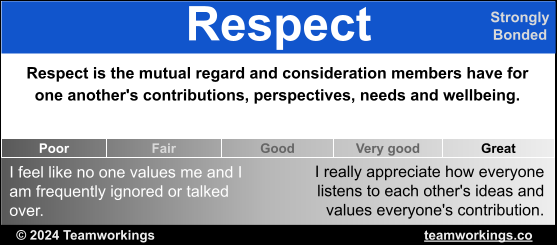
Why Respect is the Cornerstone of Effective Teamwork
In today’s hyper-collaborative world, teams thrive not just on skills or goals—but on something more human: respect.
At its core, respect is the mutual regard and consideration team members show for each other’s contributions, perspectives, needs, and wellbeing. It’s about making space for every voice and seeing value in diversity—not just of identity, but of thought, experience, and style.
Think about it: how many meetings have you been in where brilliant ideas were ignored because someone didn’t feel heard? Or where decisions were made without truly considering different viewpoints?
The impact is real. Teams lacking respect often face poor morale, low psychological safety, and even high turnover. On the flip side, teams that embed respect into their daily habits create the foundation for trust, inclusion, and innovation.
⭐ Hallmarks of respect
So what does respect in action look like?
⭐ Valuing contributions of others
⭐ Embracing diverse viewpoints
⭐ Active listening
⭐ Inclusivity
⭐ Mutual support
⭐ Constructive conflict resolution
⭐ Mutual encouragement
⭐ Empathy & sensitivity to needs
⭐ Considerate decisions & actions
⭐ Constructive feedback
Active listening means truly hearing others without interrupting or dismissing.
Inclusivity is about making sure all voices are not just welcomed, but encouraged.
Empathy involves considering the emotional and practical needs of teammates.
Constructive feedback is offering insights in ways that uplift, not diminish.
Valuing contributions acknowledging everyone’s input, not just the loudest.
And importantly, it’s not just about being “nice.” Respect is an engine for better outcomes. When team members feel valued, they’re more likely to contribute boldly, challenge ideas productively, and support each other through change.
Leaders: You Set the Tone
Respect starts at the top. Model it. Reinforce it. And when you see it lacking—call it out.
Build team rituals that celebrate diversity, foster empathy, and promote personal connections.
Because when people feel respected, they don’t just show up—they bring their whole selves to the table.
💬 How do you cultivate respect in your team?

Leave a Reply